|
|
|
Sort Order |
|
|
|
Items / Page
|
|
|
|
|
|
|
| Srl | Item |
| 1 |
ID:
065717
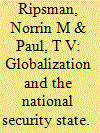

|
|
|
| 2 |
ID:
098824
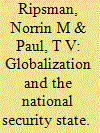

|
|
|
|
|
| Publication |
Oxford, Oxford University Press, 2010.
|
| Description |
285p.
|
| Standard Number |
978195393910
|
|
|
|
|
|
|
|
|
|
|
|
Copies: C:1/I:0,R:0,Q:0
Circulation
| Accession# | Call# | Current Location | Status | Policy | Location |
| 055209 | 355.033073/RIP 055209 | Main | On Shelf | General | |
|
|
|
|
| 3 |
ID:
180364
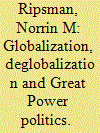

|
|
|
|
|
| Summary/Abstract |
Commercial liberalism would suggest that whereas globalization was conducive to great power cooperation—or at least moderated competition—deglobalization is likely to ignite greater competition amongst the Great Powers. In reality, however, the picture is much more complex. To begin with, the intense globalization of the 1990s and 2000s is not responsible for moderating Great Power tensions; instead, it is itself a product of the security situation resulting from the end of the Cold War. Furthermore, while globalization did serve to reinforce cooperation between the United States and rising challengers, such as China, which sought to harness the economic gains of globalization to accelerate their rise, it also created or intensified fault-lines that have led to heightening tensions between the Great Powers. Finally, while we are currently witnessing increasing tensions between the US and both China and Russia, deglobalization does not appear to be the primary cause. Thus, geoeconomic conditions do not drive security relations; instead, the geoeconomic environment, which is itself influenced by Great Power politics, is better understood as a medium of Great Power competition, which may affect the character of Great Power competition and its intensity, but does not determine it.
|
|
|
|
|
|
|
|
|
|
|
|
|
|
|
|
| 4 |
ID:
084292


|
|
|
|
|
| Publication |
2008.
|
| Summary/Abstract |
When can economic sanctions and incentives achieve important political objectives? Why do they often fail? We propose a political theory of economic statecraft, arguing that the success of economic statecraft does not depend on the magnitude of its economic effect. Instead, it succeeds when the economic pain or gain it engenders translates into political costs or opportunities. We argue that the political effects of economic signals will depend on a variety of international and domestic political factors, the most important of which is the target state's level of stateness, comprised of three components: autonomy, capacity, and legitimacy. When economic statecraft motivates key domestic coalitions to push for policy change, high stateness enables target state leaders to resist their calls and defy the sender. Conversely, when economic statecraft convinces target leaders that they ought to comply with the sender's demands, high stateness enable them to overcome domestic opposition to compromise. To evaluate the usefulness of our theory, we employ a plausibility probe, testing our approach against three leading alternatives (the realist, economic liberal, and domestic conditionalist approaches) with case studies of Western economic incentives to Hungary and Romania after the Cold War and Indian sanctions against Nepal in the late 1980s.
|
|
|
|
|
|
|
|
|
|
|
|
|
|
|
|
| 5 |
ID:
076999
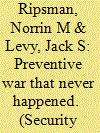

|
|
|
|
|
| Publication |
2007.
|
| Summary/Abstract |
The theory of "preventive war" states that, under certain conditions, states respond to rising adversaries with military force in an attempt to forestall an adverse shift in the balance of power. British and French passivity in response to the rapid rise of Germany in the 1930s would appear to constitute one of the leading empirical anomalies in the theory, one the theory's proponents must explain. After clarifying the meaning of the preventive motivation for war and specifying the conditions under which it should be the strongest, we examine French and British behavior in the crises over the Rhineland in 1936 and Sudeten Czechoslovakia in 1938 through an intensive study of government documents and private papers. We argue that French political leaders, anticipating a continuing adverse shift in relative power, wanted to confront Hitler, but only with British support, which was not forthcoming. British leaders believed, even by 1936, that the balance of power had already shifted in Germany's favor, but that German ascendancy was only temporary and that British rearmament would redress the balance of power in a few years. We contrast our argument with alternative interpretations based on domestic political pressures and ideologically driven beliefs and interests
|
|
|
|
|
|
|
|
|
|
|
|
|
|
|
|
| 6 |
ID:
066926


|
|
|
| 7 |
ID:
083706
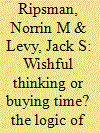

|
|
|
|
|
| Publication |
2008.
|
| Summary/Abstract |
Scholars typically define appeasement as a policy of satisfying grievances through one-sided concessions to avoid war for the foreseeable future and, therefore, as an alternative to balancing. They traditionally interpret British appeasement of Adolf Hitler in the 1930s as a naïve attempt to maintain peace with Germany by satisfying his grievances. The standard conceptualization of appeasement and the empirical treatment of the 1930s, however, are theoretically limiting and historically incorrect. Appeasement is a strategy of sustained, asymmetrical concessions with the aim of avoiding war, at least in the short term. There are three distinct variations of appeasement: (1) resolving grievances (to avoid war for the foreseeable future); (2) diffusing secondary threats (to focus on a greater threat); and (3) buying time (to rearm and/or secure allies against the current threat). British appeasement was primarily a strategy of buying time for rearmament against Germany. British leaders understood the Nazi menace and did not expect that appeasement would avoid an eventual war with Germany. They believed that by the time of the Rhineland crisis of 1936 the balance of power had already shifted in Germany's favor, but that British rearmament would work to reverse the balance by the end of the decade. Appeasement was a strategy to delay an expected confrontation with Germany until the military balance was more favorable.
|
|
|
|
|
|
|
|
|
|
|
|
|
|
|
|
|
|
|
|
|